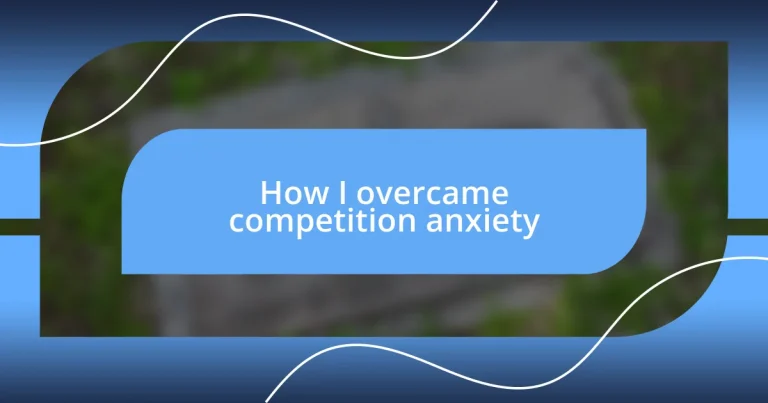Key takeaways:
- Competition anxiety stems from the fear of judgment, comparisons, and past failures, affecting individuals differently.
- Effective coping strategies include deep breathing, visualization, and maintaining a supportive network, which can help manage anxiety and boost confidence.
- Sharing experiences with others fosters connection, reduces feelings of isolation, and highlights the universality of competition anxiety.
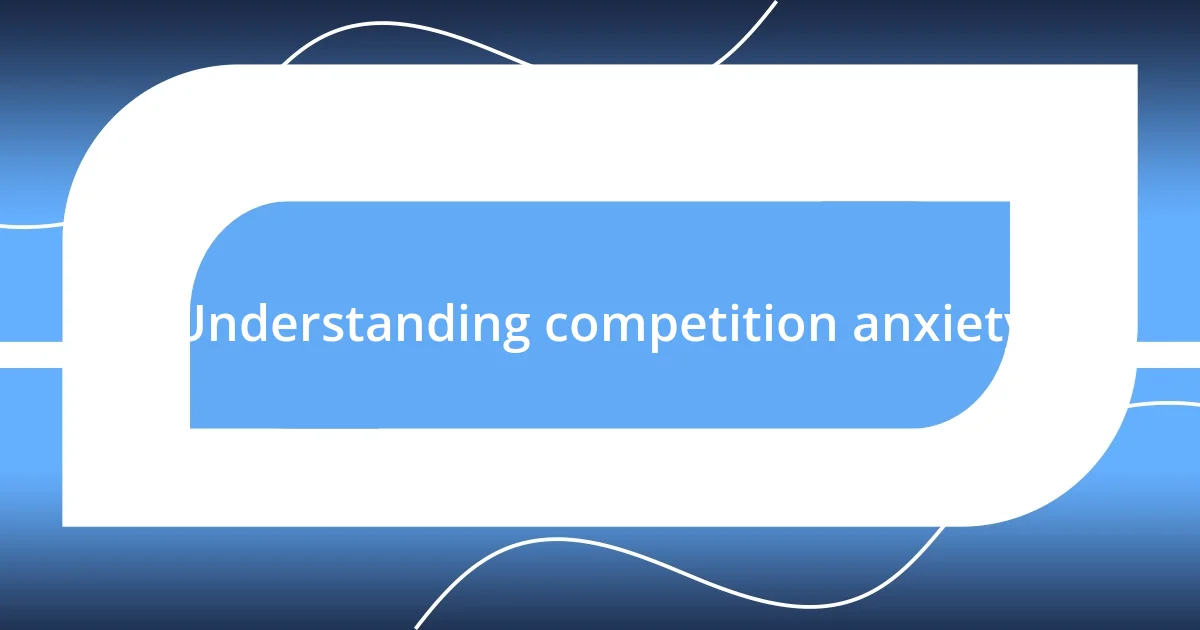
Understanding competition anxiety
Competition anxiety is a common experience that many of us face, often emerging before important events like exams or sports matches. I remember vividly standing at the edge of the track, heart racing, feeling almost paralyzed by the thought of everyone watching. Have you ever felt that tightness in your chest when you realize others are competing for the same goal? That sense of being scrutinized can amplify our fears, leaving us convinced that failure is imminent.
What’s fascinating to me is how competition anxiety manifests differently for everyone. For me, it often came with a rush of negative thoughts, as if my mind was steeped in self-doubt. I couldn’t help but wonder if my competitors were somehow more skilled or prepared than I was. It’s like an internal battle—one part of you believes in your capabilities, while another part amplifies feelings of inadequacy. Can you relate to that feeling of being torn between confidence and insecurity?
Understanding the psychological roots of competition anxiety reveals just how deeply it can affect us. It starts with our fear of judgment, both from ourselves and others. I found that the stakes felt even higher when I was worried about what my peers would think of my performance. This awareness led me to realize that confronting these fears isn’t just about surviving the competition; it’s about reclaiming my narrative and finding joy in the pursuit of my goals.
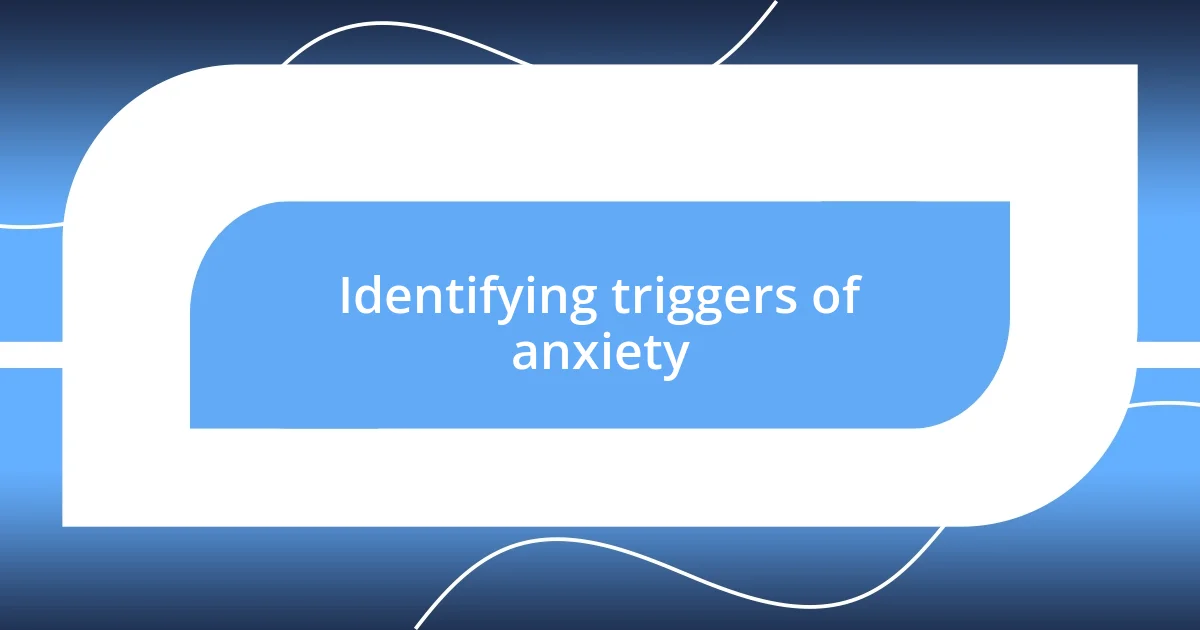
Identifying triggers of anxiety
Identifying triggers of anxiety often feels like peeling an onion—layer by layer, I uncover what really sets off that anxious response. I recall sitting in the locker room before a big game, suddenly overwhelmed by the noise, the chatter, and a sinking feeling that I wasn’t ready. It dawned on me that my triggers weren’t just the competition itself, but also the environment and expectations surrounding it. Each event seemed to carry its own set of stressors that I had to confront.
Here are some common triggers that might resonate with you:
- Pre-competition jitters: The anticipation leading up to an event can often stir feelings of anxiety.
- Comparisons with others: Focusing on how my peers are performing compared to me amplifies my self-doubt.
- Fear of judgment: The thought of disappointing others or facing negative evaluations can be paralyzing.
- Past experiences: Recollections of previous failures create a mental loop that feeds anxiety.
- Perfectionism: My desire to perform flawlessly often backfires, leading to crippling self-pressure.
Just like that moment in the locker room, identifying these triggers helps me confront them head-on. I found that acknowledging these sparks of anxiety allows me to reclaim some control.
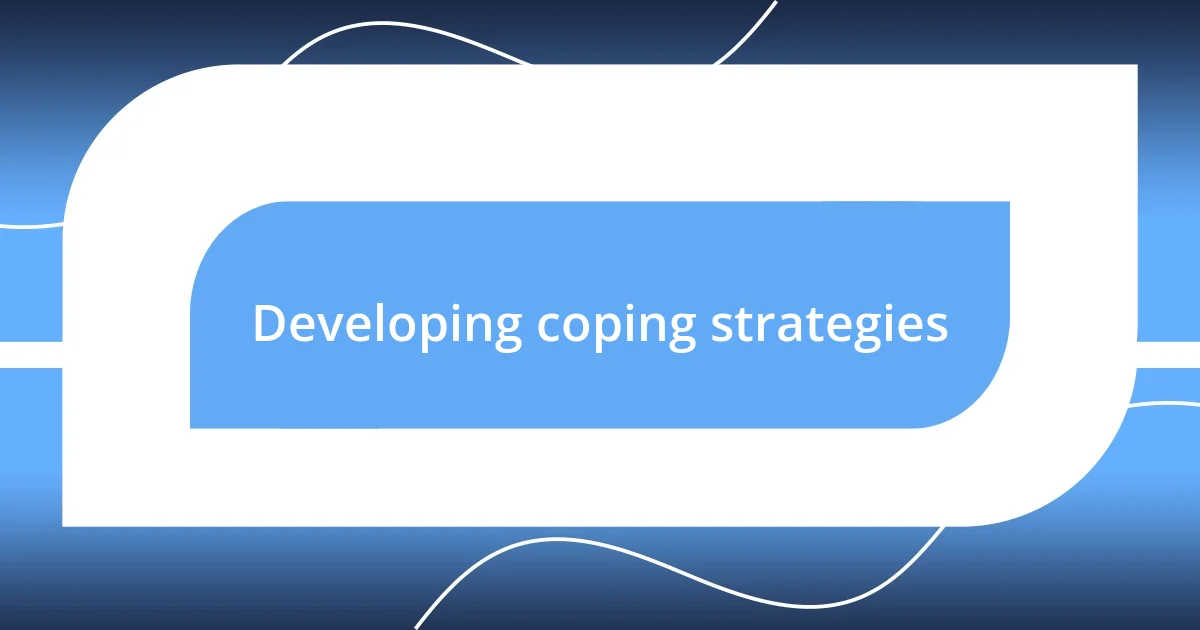
Developing coping strategies
Developing coping strategies is a personal journey—one that requires a tailored approach to combat competition anxiety. I’ve discovered that deep breathing exercises are incredibly effective for me. Every time I feel that familiar knot of anxiety, I take a moment to close my eyes, breathe deeply, and visualize success. This simple practice transforms my racing thoughts into a rhythm of calmness, allowing me to step into my performance with clarity and focus.
Another strategy that has served me well is visualization. I remember a particularly daunting career presentation where my nerves were through the roof. Instead of succumbing to that anxiety, I took time to picture myself delivering a confident and engaging talk. Imagining the positive reactions of my audience transformed my anxiety into excitement. Have you ever tried visualizing your success? It might just reshape your perception of the upcoming challenge.
Lastly, maintaining a supportive network cannot be underestimated. Sharing my feelings with friends who understand competition anxiety has been incredibly freeing. It’s like echoing a sentiment that resonates with all of us: I’m not alone in this. Together, we’ve developed a practice of regular check-ins to support and uplift each other before major events. This sense of community has made a world of difference in my ability to handle those intense moments. How would it feel for you to lean on others during tough times?
| Coping Strategy | Personal Experience |
|---|---|
| Deep Breathing Exercises | Transforms racing thoughts into calmness. |
| Visualization | Picturing success helped me face daunting challenges. |
| Supportive Network | Regular check-ins with friends create a sense of community. |
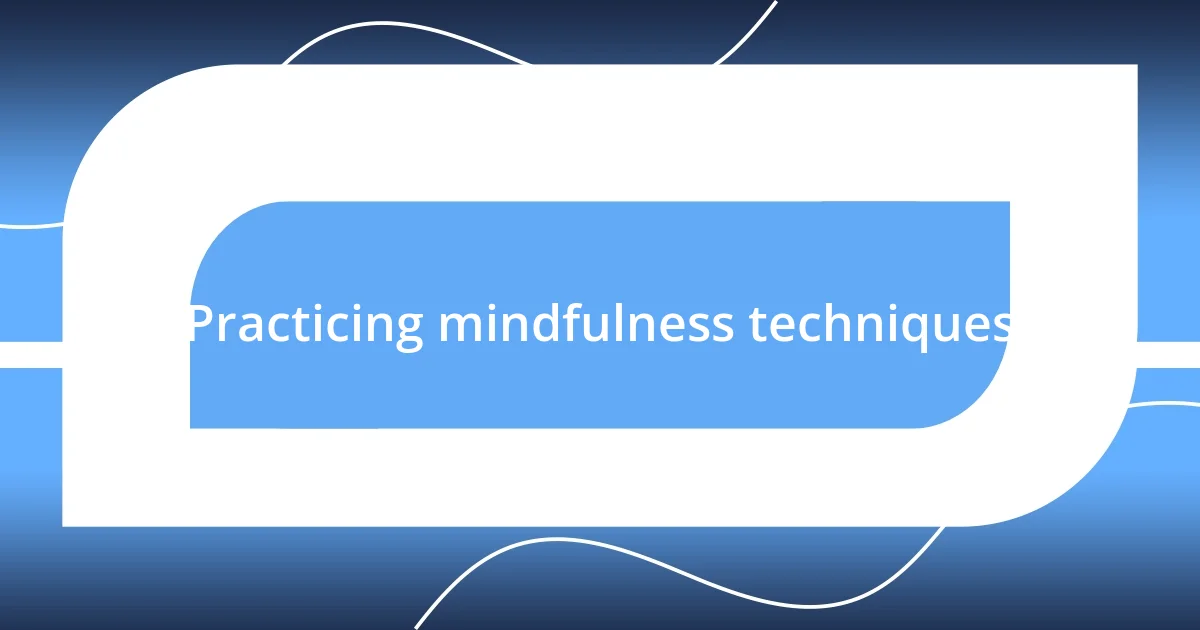
Practicing mindfulness techniques
Practicing mindfulness techniques has been a transformative experience for me. Integrating moment-to-moment awareness into my daily routine helps ground me when anxiety begins to creep in. For instance, I often find myself pausing during high-pressure situations to focus on my breath and simply observe my surroundings—like the sounds, the smells, or even the feel of the ground beneath my feet. Have you ever considered how a simple pause can shift your perspective?
One technique that I cherish is mindful movement, particularly through yoga. I remember once feeling overwhelmed before a big competition, and instead of succumbing to that whirlwind of thoughts, I laid out my mat and flowed through some poses. With each stretch, I let go of my worries and tapped into a deeper sense of connection with my body. It’s incredible how tuning into our physical self can alleviate mental tension; this practice became my secret weapon in those moments of anxiety.
I’ve also embraced gratitude journaling as a mindfulness practice. Each night, I jot down a few things I’m thankful for, even on days filled with competitive stress. This act not only shifts my focus from anxiety to appreciation, but it also cultivates a sense of resilience. How powerful is it to end the day with positivity rather than worry? Reflecting on this has reinforced my journey in overcoming competition anxiety, making it a little easier to step into the spotlight.
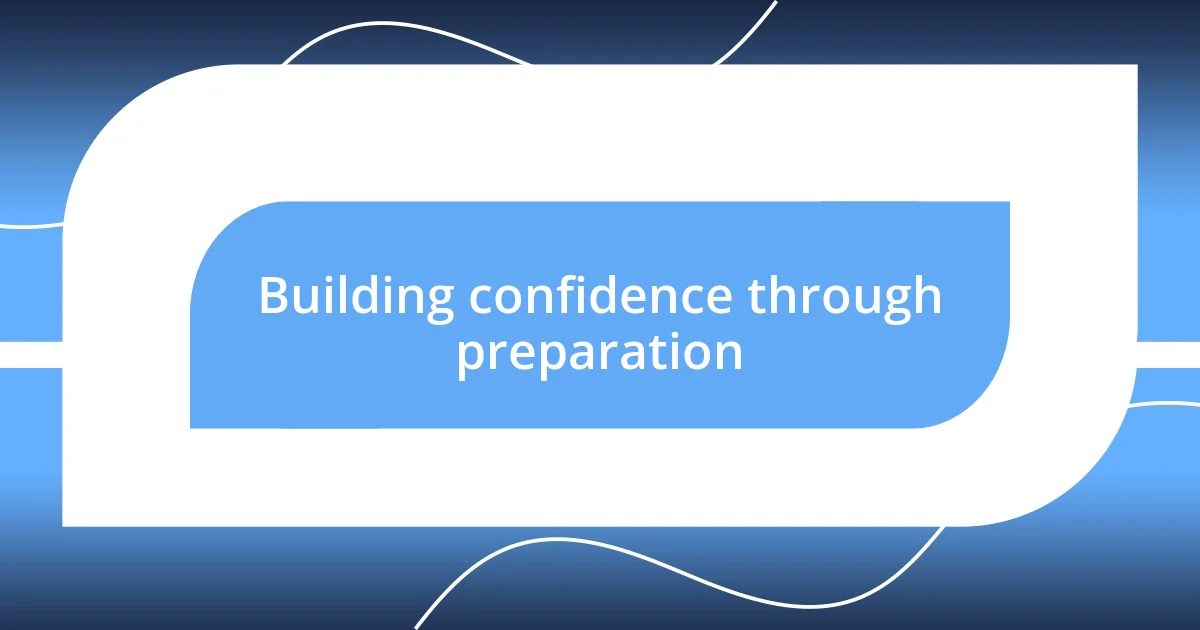
Building confidence through preparation
Building confidence through preparation has been a game changer for me. I vividly remember the time I had a big presentation coming up. I decided to spend a week preparing thoroughly—not just by practicing my speech, but also by researching my audience and crafting engaging visuals. The moment I walked into that room, I felt like I was stepping onto a stage I had already conquered in my mind. It was exhilarating.
Creating a structured plan has helped me immensely. I often break down my preparation into manageable tasks, much like a checklist. Each time I tick off a task, I feel a surge of accomplishment, which directly boosts my confidence. It’s fascinating how the act of preparation can shift your mindset from uncertainty to assurance, don’t you think? It’s like having a roadmap leading to success.
On the day of the event, I remember feeling a delightful mix of nerves and excitement—both of which are completely normal. I reflected on all the work I had put in and realized that preparation wasn’t just about the knowledge itself but the confidence that came with it. With each deep breath, I reminded myself that I had equipped myself for this moment. Why not let your efforts shine when the opportunity arises? After all, the preparation stage can transform anxiety into a powerful sense of empowerment.
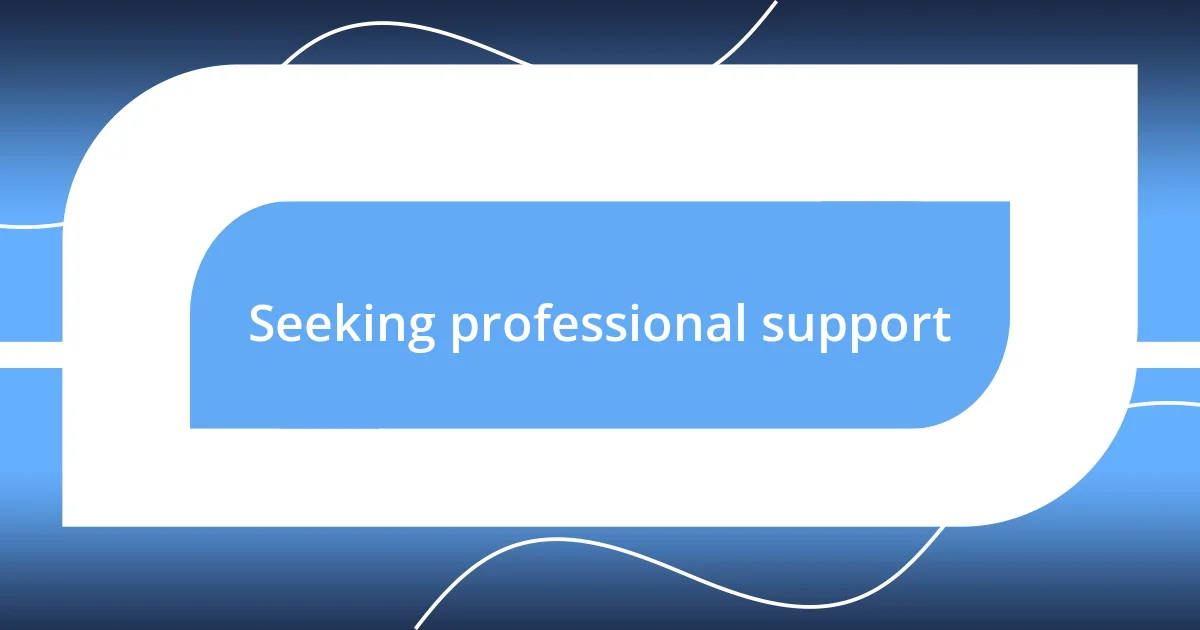
Seeking professional support
Seeking professional support can be an invaluable step in overcoming competition anxiety. I recall a time I felt completely overwhelmed before a major event, and the thought of talking to a therapist seemed daunting. Yet, when I finally did, it felt like discovering a hidden pathway—a way to untangle my thoughts and fears with guidance. Have you ever noticed how sometimes just expressing what you’re feeling can lift a weight off your shoulders?
Working with a professional not only provided me with tools to manage my anxiety but also helped me view my challenges through a different lens. I remember one session where I expressed my fear of judgment from others. My therapist allowed me to explore those feelings deeply and helped me realize that most people are focused on their own performance, not judging mine. It was enlightening to shift my perspective, realizing that freeing myself from that worry opened up a new world of possibilities.
Additionally, group therapy created a sense of community that I never knew I needed. Sharing my experiences with others who understood my struggles was surprisingly comforting. I think back to those sessions filled with laughter, tears, and the realization that we were all navigating similar battles. Isn’t it reassuring to know you’re not alone in your journey? This support not only empowered me but also reinforced the idea that professional help can truly make a difference in conquering competition anxiety.
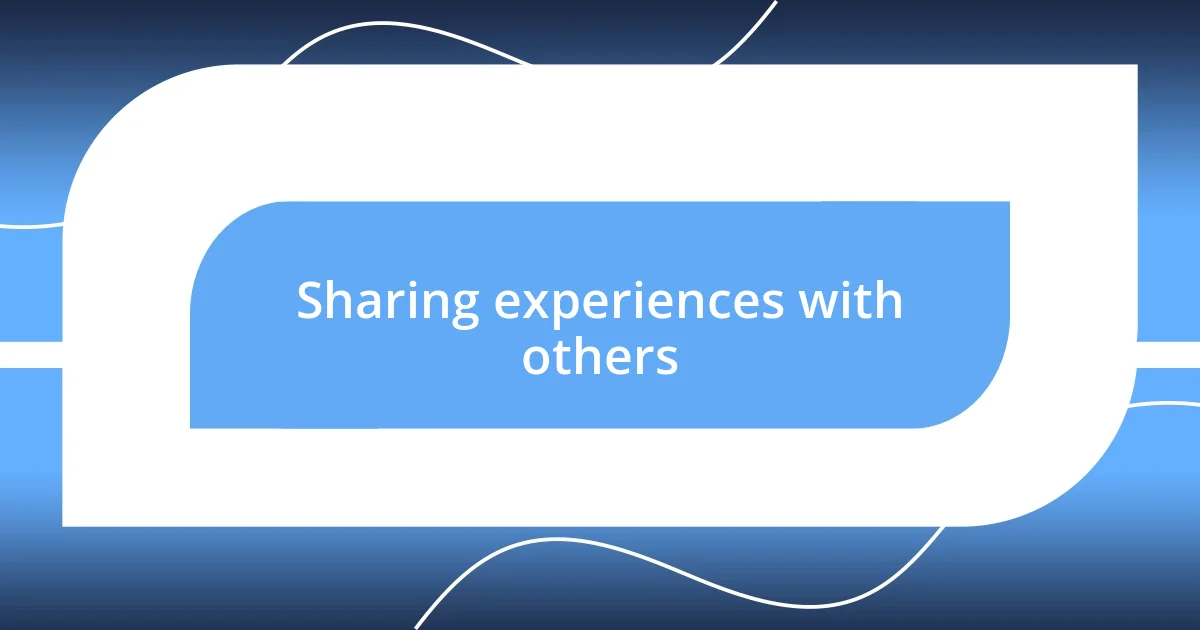
Sharing experiences with others
Sharing experiences with others can create a profound sense of connection. I remember a time when I attended a workshop on overcoming anxiety. As we opened up about our fears, I felt a strange mix of vulnerability and relief. Hearing others articulate their struggles made mine feel less isolating. Have you ever found solace in a room full of strangers who seem to understand your plight? That shared vulnerability has the power to heal.
When I started sharing my own experiences with competition anxiety, I was surprised by the response. For instance, a simple story about my first public speaking gig led to a flood of similar anecdotes from my peers. Their candidness allowed me to reflect on how I had previously believed I was alone in my struggles. It suddenly struck me—why hadn’t I realized sooner that our fears often echo one another? This kind of sharing fosters camaraderie and reassurance.
Moreover, I’ve learned that conversations don’t always have to be formal. Sometimes, just chatting with a friend over coffee can reveal insights that change everything. I recall discussing my latest nervous breakdown before a big event, and my friend’s nonchalant acknowledgment of his own anxiety made me laugh. In that moment, something shifted—hearing that it’s a shared experience lightened my load significantly. Isn’t it amazing how powerful it is to recognize that the struggles we face are a part of the human experience?












